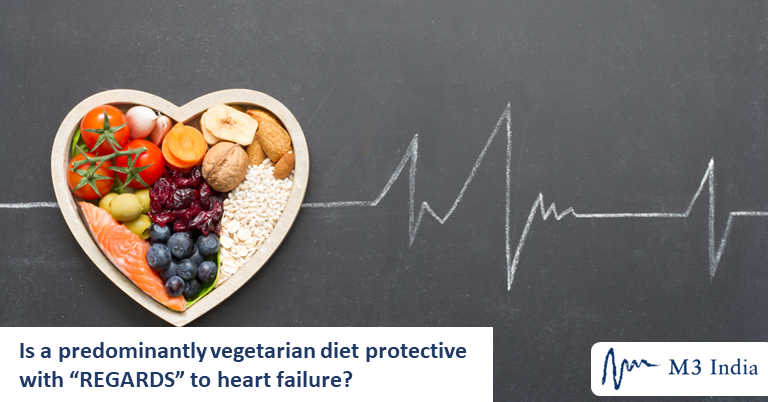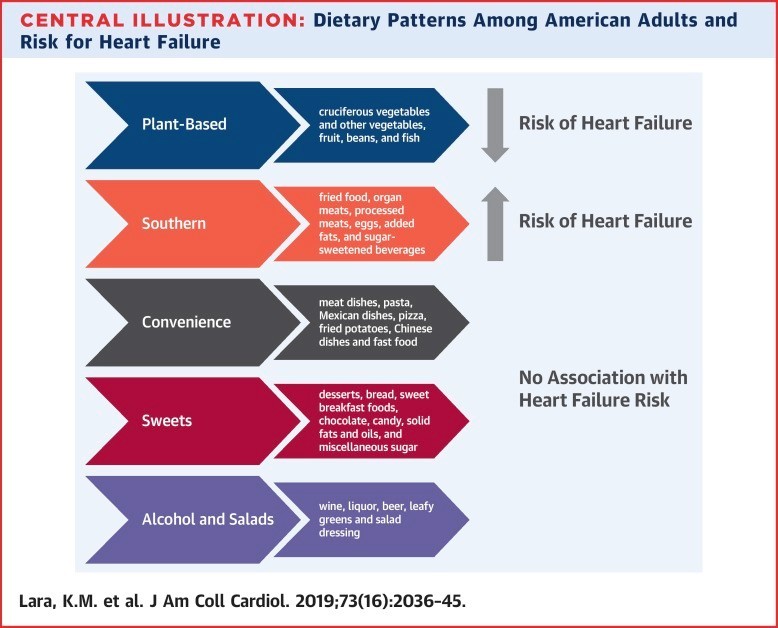Is a predominantly vegetarian diet protective with “REGARDS” to heart failure?
M3 India Newsdesk May 03, 2019
Summary
Results from REGARDS (REasons for Geographic and Racial Differences in Stroke) study, the first of its kind to include a diverse group of participants, socio-economically as well as demographically, has established a direct association between a vegetarian diet with supplementation of fish and 41% lower risk of heart failure.

The effect of diet on developing HT; DASH (Dietary Approaches to Stop Hypertension) and CAD; Mediterranean diet in PREDIMED Study are well established. The Lyon Heart Study found significant beneficial cardioprotective effects after a first myocardial infarction when compared to the Western-type diet. These diets emphasise a diet high in fruits, vegetables, beans, nuts, seeds, and minimal consumption of red meat, poultry, and eggs. On the other hand, adherence to the Southern diet (rich fried foods, meats, sweetened beverages) was associated with a higher incidence of CAD events and hypertension. However, there are certain limitations of these studies:
- The effects of these diets have been studied in specific populations only; generally, White Caucasians and therefore their impact of a wide swath of populations like Asians is not well known.
- The studies are focused on the occurrence of hypertension or CAD and look at heart failure as only secondary end-point. Moreover, these studies already have many patients with known CAD which is itself a risk factor for heart failure.
- The diets studied are very region specific and therefore the impact of other kinds of diets is unknown. A previous meta-analysis including >1 lakh participants from 7 cohort studies (Europe, Japan, and California) had revealed that a vegetarian diet was associated with a 29% risk reduction in mortality from CAD but the impact on Non-CAD heart failure is still unknown.
REGARDS trial
The REGARDS (REasons for Geographic and Racial Differences in Stroke) study originally aimed to understand differences in stroke mortality between whites and blacks and geographic differences in stroke rates across the United States. They identified 5 major dietary patterns common in US: convenience, plant-based, sweets, southern, and alcohol and salad.
- Convenience dietary pattern/fast food pattern loaded most heavily on meat dishes, pasta, Mexican dishes, pizza, fried potatoes, Chinese dishes, and other fast food
- Plant-based pattern/vegetarian diet comprising primarily (but not exclusively) of cruciferous vegetables (green leafy vegetables like cauliflower, cabbage, broccoli, Brussels sprouts etc) and other vegetables, fruit, beans, and fish
- Sweets/fats pattern, loaded most heavily on desserts, bread, sweet breakfast foods, chocolate, candy, solid fats and oils, and miscellaneous sugar
- Southern pattern/Western diet (similar to the culinary pattern of the Southeastern United States) comprising of fried food, organ meats, processed meats, eggs, added fats, and sugar-sweetened beverages
- Alcohol/salads pattern comprising of leafy green vegetables, salads and their dressings but also wine, liquor, beer
The study also evaluated broader population groups; Whites, blacks, and different geographic areas although only within US. This study is the first to look for the impact of diet on the risk of heart failure in non-CAD patients in a wider population group.
Researchers found that:
- A higher adherence to a plant-based diet is associated with a 41% lower risk of incident heart failure hospitalisation.
- On the other hand adherence to the Southern dietary pattern was associated with a 72% higher risk of incident heart failure (although the association was attenuated after adjusting for potentially confounding factors like obesity (BMI, WC), hypertension, dyslipidemia, DM, AF, albumin-to-creatinine ratio, and eGFR.
- No significant associations were observed in the other patterns.

Why benefit of a vegetarian diet in non-CAD patients?
While the benefit of plant-based diets on the occurrence of CAD is well understood (because processed/red meat can cause obesity and dyslipidaemia, it being rich in trans-fats and saturated fats), how can it reduce heart failure in patients with non-manifest CAD?
Predominantly plant-based diets have an abundance of antioxidants and anti-inflammatory agents. Reactive oxygen species (ROS) promote myocyte hypertrophy, aortic stiffness, apoptosis, and interstitial fibrosis, all which can possibly contribute to the development of heart failure.
Predominantly vegetarian diets are rich in plant antioxidants which can reduce the amount of ROS via proposed pathways of redox balance, cell signalling, and cell function, thus improving myocardial contractility and thus reducing heart failure.
Furthermore, systemic inflammatory biomarkers are associated with a higher incidence of heart failure but plant-based diets which have been associated with decreased serum concentrations of CRP, interleukin-6, and soluble intercellular adhesion molecule can thus reduce risk of heart failure.
Why the risk of heart failure with Western diet?
Southern dietary pattern may increase the risk of heart failure through a variety of factors associated with obesity, visceral adiposity, hypertension, dyslipidemia, and CKD.
Applying to Indian context
Based on currently available data it can be concluded that a predominantly vegetarian diet (supplemented by fish) is protective not only against CAD and hypertension but also heart failure independent of CAD. On the other hand, Western continental diet (Southern diet) rich in processed meats and sweetened beverages can predispose people to heart failure independent of its effect on CAD and hypertension risk.
Disclaimer- The views and opinions expressed in this article are those of the author's and do not necessarily reflect the official policy or position of M3 India.
The writer, Dr. Sundeep Mishra is a Professor of Cardiology.
-
Exclusive Write-ups & Webinars by KOLs
-
Daily Quiz by specialty
-
Paid Market Research Surveys
-
Case discussions, News & Journals' summaries